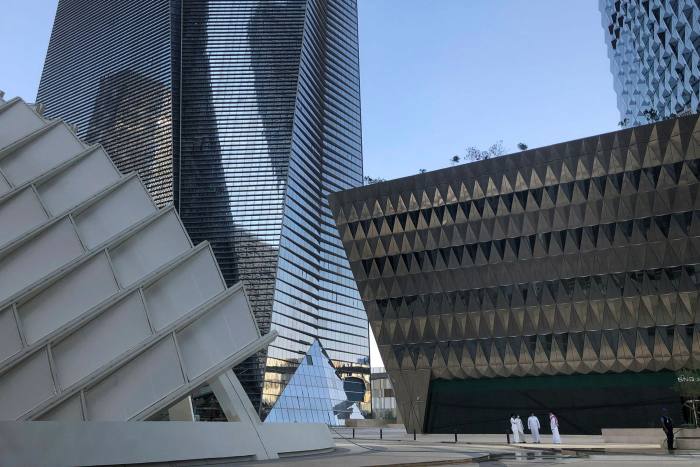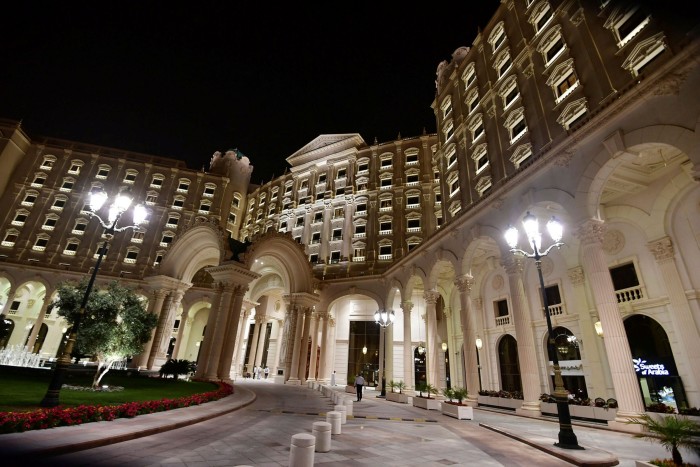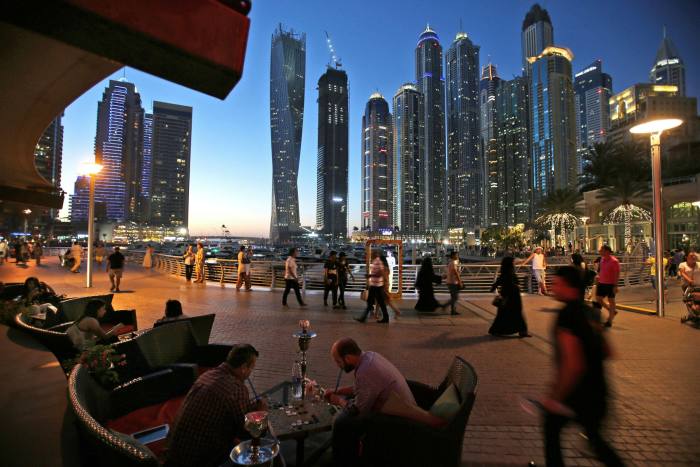Gulf tensions: Saudi Arabia flexes its economic muscles
When Saudi Arabia abruptly amended its rules for imports from neighbouring Gulf states, executives at an UAE conglomerate were stunned into action. They ordered company trucks packed with everything from cardboard packaging to steel pallets to return to Dubai from the Saudi border, while officials urgently phoned clients in the kingdom to ask if they would accept the increased cost of tariffs of between 5 per cent and 15 per cent on products that for years had been shipped tariff-free.
“We were in an absolute panic,” says an executive at the company. “We had no idea what to do with the cargo.”
Cross-border trade was disrupted for a week in July before the company’s Saudi-based clients agreed to take the financial hit and move on. But it was a stark warning that the cosy relationship companies based in the United Arab Emirates have enjoyed with Saudi Arabia — the main market for many Gulf businesses — is being shaken up.
The smaller, nimbler UAE has for decades leveraged its proximity to Saudi Arabia and the more liberal lifestyle it offers foreign executives as it built the Gulf’s premier trade and finance hub. Many of the bankers, consultants, lawyers and manufacturers who serve Saudi Arabia, the Middle East’s largest economy and the Gulf’s biggest consumer market, happily set up shop in the UAE, travelling back and forth to the more conservative kingdom when needed.
But as Crown Prince Mohammed bin Salman, Saudi Arabia’s mercurial day-to-day leader, aggressively drives ambitious plans to modernise his nation, develop new industries and create jobs for the kingdom’s youthful population, the message from Riyadh is it will no longer be business as usual.
Instead, he has made it clear that if companies want to do business in his nation, particularly with the state — the main driver of economic activity — he wants them operating in the country; employing Saudis and boosting his aspirations for transforming the once sleepy kingdom into the region’s dominant economic hub.

He and his lieutenants are betting that even if Saudi Arabia lacks many of the attributes that provide comfort to those settled in Dubai — from the independent regulator that oversees the Dubai International Finance Centre (DIFC), to the quality of schools and array of bars and restaurants — size does matter.
“The giant is waking up,” says a senior Saudi official. “While this is not against the UAE, it’s like you were asleep and dust was settling on your body. Then you wake up and shake it off.”
Riyadh calling
The “awakening” is reverberating across the UAE and the boardrooms of local and multinational businesses based in the Gulf state.
In typically robust style, Prince Mohammed began the year by setting foreign businesses an ultimatum — move their regional headquarters to Riyadh by 2024 or forget about the lucrative government contracts that are the main prize for many.
Then, Riyadh altered its regulations on imports from fellow Gulf Cooperation Council members — the UAE, Kuwait, Qatar, Oman and Bahrain. The changes withdrew GCC tariff concessions from goods manufactured in free zones, which are exempt from regulations including the requirement to be majority-owned by a national, or produced by companies where Gulf employees make up less than 25 per cent of the workforce.
Riyadh also suspended travel to the UAE and several other countries, citing coronavirus concerns, but Emiratis interpreted it as another not-so-subtle message. The UAE ban was lifted two days after Prince Mohammed and Sheikh Mohammed bin Zayed al-Nahyan, the UAE’s de facto leader, spoke by phone in September.

Executives in Dubai and Abu Dhabi, the UAE’s capital, say Emirati officials and business people were taken by surprise. “Initially there was shell shock. Plenty of clients have been told [by officials] to produce in Saudi Arabia and bring in Saudis or ‘I will put a tax on you or ban your goods’,” says a senior consultant.
International companies are also grappling with whether to heed Prince Mohammed’s call to shift their regional headquarters to Riyadh and upend the lifestyles of executives comfortable in Dubai. Pressure has increased on companies to sign licences formalising their plans ahead of Saudi Arabia’s flagship investor conference, the Future Investment Initiative, which opens on Tuesday, despite the regulatory framework still not being clear, says one executive.
In January, the authorities listed 24 companies, including PepsiCo, oil services group Schlumberger, engineering and construction group Bechtel and PwC, the consultants, that had signed provisional agreements to set up regional headquarters in Riyadh.
Another international banker based in Dubai says if his group was setting up in the region today “we would probably base ourselves in Saudi Arabia”. An executive at one multinational says his group will downsize in Dubai, and boost their operation in Riyadh because of the volume of business in the kingdom.
But some companies complain of being strong-armed, and cite it as another example of Prince Mohammed’s penchant for reverting to the stick rather than the carrot. “The feeling is initially we will be penalised,” says the banker, “but it will become the imperative [to move to Riyadh].”

Local rivals
Longtime allies, Saudi Arabia and the UAE, the GCC’s powerhouses, have a history of testy relations. In 2009, plans for a GCC central bank and common currency were scuppered when the UAE pulled out because the institution was to be based in Riyadh, not Abu Dhabi.
Relations flourished, however, after Sheikh Mohammed, Abu Dhabi’s crown prince, took on the role of supportive ally — some say mentor — to Prince Mohammed as he rapidly rose to become heir-apparent to his father, King Salman. Analysts say the relationship first began to cool after the 2018 murder of Jamal Khashoggi, with UAE leaders worried about contagion as Prince Mohammed drew widespread condemnation over Riyadh’s alleged role in the killing.
The UAE then unsettled Riyadh by withdrawing its troops from Yemen in 2019, where Saudi Arabia has led an Arab coalition against Iran-aligned Houthi rebels. More recently they briefly fell out over Opec+ oil production quotas.
Observers say the crown princes agree on fundamental issues, such as the threat of Iran and Islamist movements, but it was obvious that Prince Mohammed would not want the kingdom to be a junior partner in the relationship.
In Riyadh, officials insist they are not targeting the UAE, merely trying to achieve their own goals.
“This isn’t about the kingdom versus the UAE. Our ambitions go far beyond and Dubai will always be there, but the growth for the region is going to go like this [pointing to the ceiling] and we want to grab most of this,” says the Saudi official. “Our growth will translate into growth and prosperity for the entire region.”
Deliberately or not, the UAE is in the crosshairs. In July, the first month after the imposition of Saudi Arabia’s new tariffs, the volume of UAE imports into the kingdom slumped by about a third. Trade between the two in 2019 was $24bn with a $2.8bn surplus in Saudi Arabia’s favour, according to its official statistics. UAE data puts total trade, including re-exports, at $30bn that year, with an Emirati surplus of about $17bn.

What is not disputed is that Saudi Arabia’s $700bn economy dwarfs the UAE’s output of $421bn, while its 33m population is three times that of its neighbour, where around 90 per cent of the 10m population are expatriates.
“Saudi Arabia is the size of western Europe and it has two enormous coastlines on one of the world’s main shipping routes. If you did the economic map you would put everything in Riyadh,” says a senior banker in the region. “The UAE always relied on Saudi Arabia never executing [policy and projects], now there’s a chance it could get its act together. But there is a lot of stuff where Saudi Arabia is light years behind — it’s the nimbleness [of the UAE] versus the supertanker.”
Limited appetite
The economic firepower of Saudi Arabia, the world’s top oil exporter, has been reinforced by Prince Mohammed’s spending spree on megaprojects designed to modernise the kingdom. The Public Investment Fund, the $450bn sovereign wealth fund, has pledged to invest at least $40bn a year in the economy up to 2030.
Still, some analysts question how the kingdom will fund its myriad megaprojects and whether its financial muscle alone will be sufficient to lure new businesses to the country. Foreign direct investors have, up to now, displayed limited appetite for Prince Mohammed’s plans. Since the crown prince launched his Vision 2030 programme in 2016, FDI has been tepid, slumping from $7.45bn in 2016 to $1.42bn in 2017, according to UN data.
It rose to $5.5bn last year and officials say more than 400 licences were issued for foreign investors in the first quarter of 2021. But that was just over a quarter of the FDI received by the UAE and a long way short of the $100bn target for 2030 set by Riyadh in October as part of its latest investment strategy.
Analysts put the reticence down to concerns over the regulatory environment and subdued growth in recent years, as well as reputational damage the kingdom has suffered under Prince Mohammed’s rule. They cite Khashoggi’s murder and the extraordinary 2017 crackdown that led to hundreds of princes and businessmen — including foreign investors’ local partners — being detained in the Ritz-Carlton hotel and forced to transfer assets to the state to secure their freedom.
Lower profile arrests continue as part of what Saudi officials describe as an anti-corruption purge.

“Reputational risks are still a concern for some foreign investors,” says the senior consultant. “There is excitement about the level of business and some will chase the money, but there are those who have social concerns or have shareholders who are concerned.”
‘Simply look at the map’
Saudi officials insist they are taking action to address investor worries, from luring international schools to the kingdom — the UK’s King’s College has agreed to open a branch in Riyadh, as has Spain’s SEK Education Group — to completing construction of the King Abdullah Financial District.
First announced 15 years ago, the KAFD — which is nearing completion — has become the showpiece development for Riyadh. It is intended to be a “special investment zone” to attract foreign groups, and will be considered an offshore centre from a tax perspective. The authorities are still working on the regulatory framework. It is also building a $27bn transport network for Riyadh, including a six-line metro that is nearing completion, although work on it has slowed because of a dispute over payments involving contractors and Saudi authorities, according to people familiar with the project.
Arguably Riyadh’s biggest challenge will be luring the manufacturers it craves, to the kingdom, including automotive, aerospace, consumer goods, biotechnology, pharmaceuticals and green energy firms.

Khalid al-Falih, investment minister, insists Saudi Arabia has advantages ranging from ample land, to cheap energy, Red Sea ports that enable cargo to avoid the Strait of Hormuz chokepoint in the Gulf, and a huge petrochemicals industry that can provide inputs for manufacturers.
There are also plans to develop free zones throughout the kingdom — a model successfully deployed by the UAE. Lucid, the electric vehicle company, has agreed to begin production in the kingdom from 2024, but it is majority owned by the PIF.
Speaking in Riyadh, Falih says the model of “buying a company and bringing it here” was an option, but says the focus is on offering companies a range of incentives. “We are going to convince companies about the kingdom’s attractive value proposition,” Falih says. “The ambition is not simply to substitute imports, we want people to look at the kingdom as part of global supply chains.”
When asked how Saudi Arabia could expect to compete with the UAE, which has a decades-long head start, Falih says: “We can grow with the UAE side-by-side, and we have an advantaged location. Simply look at the map”.
A western executive believes it would be possible for Saudi Arabia to attract greater FDI if there were sufficient incentives and “you are able to employ cheap foreign labour, have low taxes and subsidised utilities, but a lot of that is going away”, he says, referring to cuts to subsidies and pressure on companies to replace foreign workers with more expensive — and at times lower skilled — local hires.
He adds that there is often confusion between different ministries that have been set targets as part of Prince Mohammed’s plans that conflict with each other.
“There’s just huge inconsistency; when you talk to people at the investment ministry it sounds like an investor’s paradise. And you talk to companies living it day in, day out and it’s hellish,” the executive says. “Part of the picture is very good and some reforms are wonderful; they are serious about deregulation and privatisation. But a lot of old habits [from late payments to unwieldy bureaucracy] are there.”

The UAE is not waiting to see how Riyadh’s plans unfold. Officials have already taken measures to counter the new competition, including offering longer-term visas for expatriates and allowing foreigners to fully own companies. While rumours abound that Saudi Arabia may legalise alcohol in certain areas, like the KAFD and Red Sea tourism projects, there is speculation that the UAE could decriminalise homosexuality and change its working week from Sunday to Thursday, to Monday to Friday.
A former western diplomat says Saudi Arabia’s neighbours will have to adapt, and points out that given the kingdom’s position in the Gulf, economically and politically, all “share a stake in the crown prince’s programme being successful”.
But they will also be warily watching Prince Mohammed’s next move.
“Saudi Arabia’s neighbours used to worry about what would happen if the kingdom imploded, now there’s concern about what happens if it starts to push its weight around,” says Kristin Smith Diwan, senior resident scholar at the Arab Gulf States Institute. “There is definitely a sense that Saudi Arabia’s leadership is not afraid to play hardball when it comes to economic competition”.

